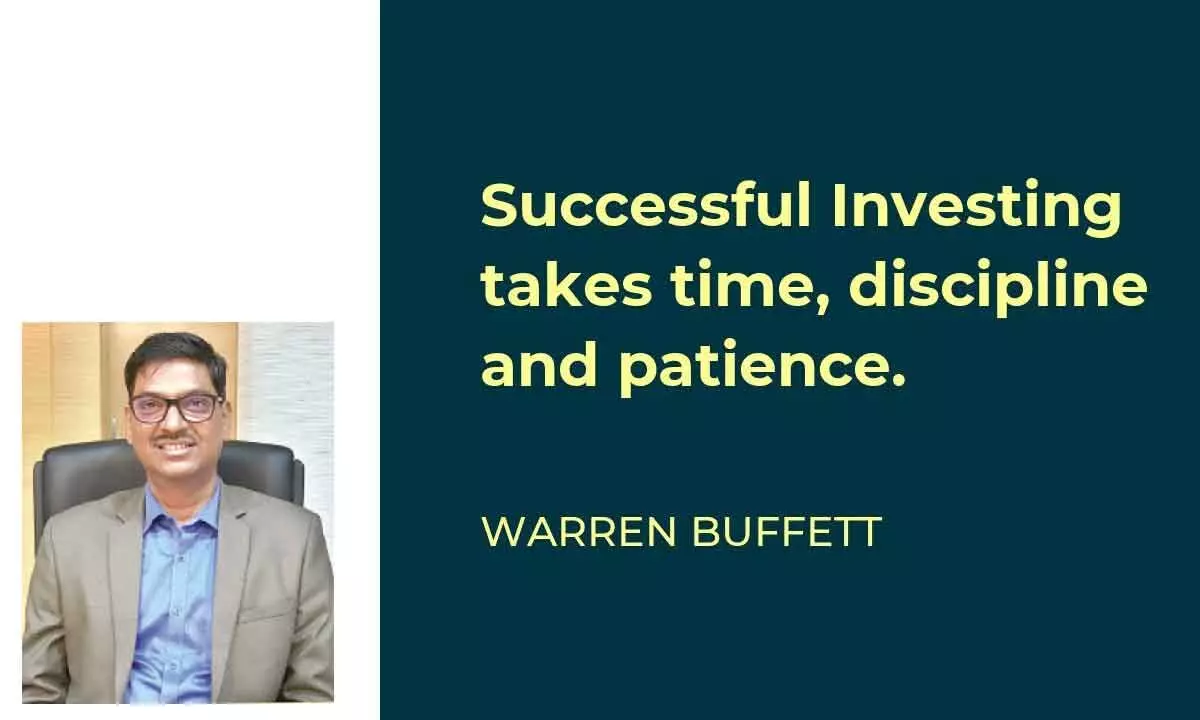To reap benefits, investors ought to cultivate discipline and patience
‘Don’t count the chickens before they are hatched’
image for illustrative purpose

Whatever may be the source of the expected return, there is bound to be an expected tentative period up to which investors must have the patience, there are bound to be certain governing principles attached to the asset classes (may not be as scientifically precise), these together with discipline and patience on the part of investors, make investment to bear the fruit, nay return
“Nivesh Phal dayak Vriksh Hai, Lagaayen Ise Aur Samuchit Seechen
Samay Ke Pahle Kaat Diya Agar, Na Phal Mile; Na Vriksh Hi Bache”
Translation: "Investment is a fruitful tree, sow it! water it!! and take its care properly!!!
Cut it down prematurely, you don’t get the fruit, you will lose tree surely. "
Although I am not an investment expert, nor an informed investor, when asked to write something on investment or saving (to me it does not make any difference), my reply customarily remains “are you crazy?”
Being a house-maker, I am not competent enough to write on the topic. But when I was told to write something to explain the above couplet, I readily agreed as this is something we have been taught since childhood. I recalled my grandparents, who while teaching us to develop patience, would recite one popular couplet:
“Kaaraj Dheere Hot Hai, Kahe Hot Adhir.
Samay Aay Taruvar Phalai, Kautuk Seencho Neer.”
This simply means that every effort takes its own time before its fruits are visible. There is no point in being impatient till the opportune time arrives. In the meantime, engage yourself in essential paraphernalia.
The referred couplet appears to be partially inspired from the above and throws an important insight into investment discipline.
Here, investment is compared with a fruitful tree. This metaphor suggests that before planning to invest in an asset class, one must have some expected return and time horizon in mind. The expected return and time horizon could be based on some past experiences, or they might have its origin in hearsay.
Whatever may be the source of the expected return, there is bound to be an expected tentative period up to which investors must have the patience, there are bound to be certain governing principles attached to the asset classes (may not be as scientifically precise), these together with discipline and patience on the part of investors, make investment to bear the fruit, nay return.
Now, I would go clause by clause to brief what I have understood. The very first clause says that investment is a fruitful tree. This tells us that any investment is done for want of return or profit. For example, if we have sown a mango tree, we must have mango fruit in our mind. So, while investing, we must have eyes on expected returns. We can’t expect orange by sowing a mango tree.
Then starts the second clause that says sow and water it properly. Now, this reminds me the predicament of my kid while requesting him to make a cup of tea. He has been explained many a time all the rules and niceties of tea-making. He understands and nods in agreement. But normally it goes like this: He pours two cups of water in the kettle, switches on the stove and starts crying from kitchen. “Mamma! How long would it take for the water to boil?” My reply is as usual, ‘Sunny, have patience water takes its own time to boil’. We can’t expedite or delay it. Despite having understood the logic, he either puts tea leaves too early so that it neither gets flavour nor colour, or it is so late that water vapours out and two cups of water are reduced to one, thereby making tea too bitter to consume. Therefore, water it appropriately to have optimal results.
Coming to the second line: Cut it down prematurely, you don’t get the fruit, you will lose tree surely.
I believe all of us must have read the story of the Golden Goose when the farmer killed the goose only to find that there were no golden eggs inside and they had also lost the goose. Now, relate it with sowing a mango tree. Depending upon whether it is a grafted or seedling tree, it takes three to five 5 years and five years or more respectively to come into bearing. But if we impatiently cut the tree prior to its gestation period, we are bereft of both the juicy fruit and a seasoned timber which a mature mango tree would have grown after due time.
I already have mentioned in the beginning that I am a novice in financial matters but when I compare my portfolio with many of so-called finance people (restricted to family members), I find myself better placed as I invest only those portions of my savings, which I don’t need in the foreseeable future. Besides, I don’t look to my portfolio as frequently, as I am not capable to make out anything out of jargons like CAGR, benchmarks, outperformance, so on and so forth. I often feel ‘Ignorance is bliss’.
(The writer is senior Vice-president, SBI Funds Management Ltd; Translation by Rupam Das, a home-maker and disciplined investor)

